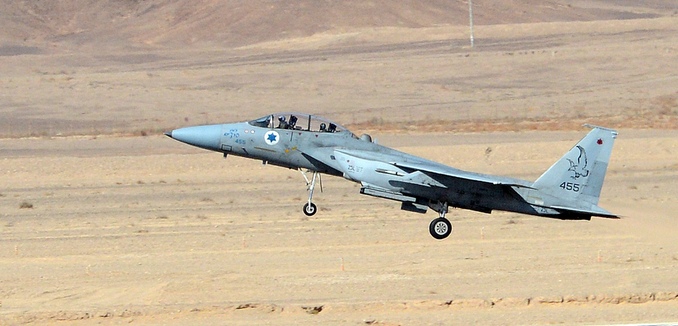IDF jets struck a convoy on the Syria-Lebanon border carrying weapons to the terror group Hezbollah on Tuesday, Israel’s Channel 2 reported.
The attack reportedly took place near what Channel 2 described as a “safe haven” for Hezbollah in Syria. In recent years, Israel has targeted a number of Lebanese arms depots believed to be storing high-impact weapons meant for Hezbollah. The private intelligence agency Stratfor reported last month that Hezbollah was building a fortified base on the border between Lebanon and Syria.
UPDATED: Israeli Strikes on Lebanon-Syria Border https://t.co/ozxYk0IFIw via @DavidADaoud pic.twitter.com/7WvVbSE5DN
— Military Edge (@Military_Edge) May 10, 2016
Though Israel does not usually acknowledge these attacks, Israeli Prime Minister Benjamin Netanyahu said that “We act when we have to act, including here and across the border, with dozens of strikes, to prevent Hezbollah acquiring tie-breaking weaponry.”
Later that month, IDF deputy chief of staff Maj. Gen. Yair Golan told reporters that the next war between Israel and Hezbollah would be “devastating,” due to Hezbollah’s tactic of hiding military assets in civilian areas. An Israeli defense official told The New York Times last May that the buildup of Hezbollah’s terror infrastructure in southern Lebanese villages meant that “civilians are living in a military compound” and that their lives were at risk. A few days later, a newspaper linked to Hezbollah confirmed the Israeli assessment. Reports emerged two years ago that Hezbollah was offering reduced-price housing to Shiite families who allowed the terrorist group to hide rocket launchers in their homes.
United Nations Security Council Resolution 1701, which was passed unanimously to end the 2006 war between Israel and Hezbollah, forbids the transfer of weaponry to Hezbollah. However, Iran has continued to arm Hezbollah and the Security Council has refused to act to enforce the resolution.
During a meeting with Hezbollah leader Hassan Nasrallah in August, Iranian Foreign Minister Mohammad Javad Zarif boasted that Iran’s nuclear deal with global powers presented “a historic opportunity” to confront Israel. Before the deal was completed, former Iranian president Ali Akbar Hashemi Rafsanjani, an ally of current president Hassan Rouhani, said that Israel feared the agreement because it would strengthen Iran, adding that one day Israel would be “wiped off the map.”
[Photo: U.S. Embassy Tel Aviv / Flickr ]




